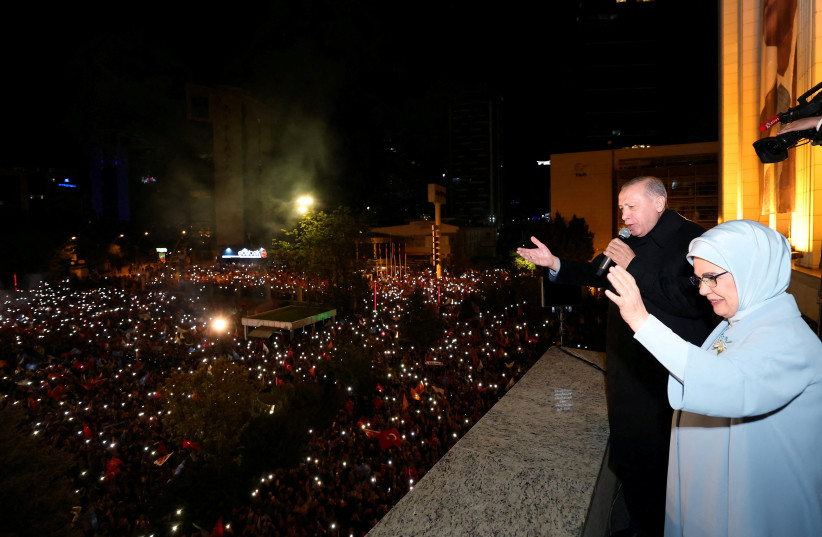Turkey’s election on Sunday saw a record number of voters flock to the polls in a country that has become more authoritarian under the ruling AKP Party’s two decades in power.
Main challenger Kemal Kilicdaroglu appeared to receive around 45% of the vote, with 24 million votes, according to Turkish state media. The presidential election would go to a runoff between President Tayyip Erdogan and Kilicdaroglu on May 28, as neither can reach the 50% threshold to win outright, Turkish High Election Board chairman Ahmet Yener said Monday.
With around 35,000 votes left to be counted, Erdogan had 49.51% of the vote and Kilicdaroglu had 44.88%, he told reporters.
The high turnout shows that Turkish voters are not despondent. They also voted for more than a dozen parties for parliament, though some will not cross the electoral threshold.
The end result in both the presidential and parliamentary elections is that the country continues to be divided – as it has been in recent decades – between the right-wing religious AKP, which is rooted in the Muslim Brotherhood, and Center-Left nationalists, left-wing and far-right nationalist parties.

On the one hand, Turkey’s elections look like any other election in this respect. But two decades of one-party dominance has meant that much of the landscape is not what it was.
Most opposition media have been shut down, so news output is primarily run by either state media managed by the AKP or by pro-AKP media. As such, during the election, it was difficult to rely on the data coming out of these media outlets, which always depicted Erdogan as winning.
Over the last decade, many opposition politicians have been imprisoned, including Selahattin Demirtas, former co-chairman of the Peoples’ Democratic Party; and Canan Kaftancioglu, president of the Republican People’s Party in Istanbul. Istanbul’s mayor received a sentence and was banned from politics. He is appealing the ban. Politicians have been imprisoned on flimsy charges or accusations of “terrorism,” for which evidence is never provided by the ruling party.
This means that although Turkey’s elections had a record turnout and numbers, the overall landscape of elections is similar to many countries that have a mixed democracy, where there are multiple parties, but trends work against the opposition being a legitimate contender.
The opposition knows that if it campaigns too hard, or challenges too much, its leaders could end up in prison. This means that Ankara’s elections have more commonalities with those in Venezuela, Russia, Iran and Egypt than with fully free and fair elections held in more Western countries, such as Denmark or the UK.
Democracy has been only a part of Turkey’s history, and it has suffered several military coups over the last century.
Yet, Turkey remains a member of NATO, the historic legacy of the Cold War, within which it tends to not only be pro-Russia but also opposes other democracies, such as Sweden, from joining.
For some observers, Ankara’s policies are not antidemocratic or anti-Western; they are merely an independent foreign policy touched by nationalism and leaning toward respect for religion.
That means some observe Turkey in the previous pre-AKP era as too much of a nationalist-secular state, one that discriminated against minorities like the Kurds, and that the AKP is merely a natural response to that, replacing one type of nationalist secular authoritarianism with another.
This sentiment ignores that Turkey once had a free press and a chance in the early 2000s to become more democratic, as opposed to less.
The high election turnout shows that despite decades of one-party power and changes to the government structure that have centralized power in the presidency, people still hunger for democracy. This is because when people are given the window of opportunity for even partial democracy, they will take it. That was the case in Mexico in the 1980s and 1990s, when it transitioned from PRI-dominated rule to a full democracy in 2000.
Today, Ankara faces many challenges. The economy, which helped bring the AKP to power decades ago, is struggling with inflation. Turkey sought to distance itself so much from the West. Now it finds itself stuck dealing with Russian President Vladimir Putin and the Iranians on varying issues, such as Syria and Ukrainian grain deals.
Ankara’s decision to acquire the S-400 air-defense system from Russia and its attacks on the US-backed SDF in Syria have led to anger at it in the US Congress, bringing further difficulty for Turkey to acquire new defense products from the US.
Regardless of how the final vote turns out, the opposition has an uphill battle. Even if it could reverse two decades of one party running the country, Turkey today is a changed landscape: Demographics, rising nationalism and religion brought the AKP to power.
The historic discrimination against Kurds has meant that the opposition often lacked a key constituency needed for support. The religious symbolism used by the AKP, such as a final election-style event in Hagia Sophia – the former church turned mosque, turned museum, turned mosque again – was all about combining Ottoman-era symbolism of religion and state.
This is the same kind of manifesto that Putin and the Tehran regime have used. The rise of the authoritarian Right is not unique to Turkey, and it is happening all over the world, which means that those fighting for a historic version of the secular center face an uphill battle – the same uphill battle that the historic Center-Left is currently facing in Israel and India.
It is not by chance that in Turkey, India and Israel, similar politics that blend religion and nationalism have done well in recent decades. Unseating that style of politics is not easy, and even when it happens, it has to grapple with larger societal trends.
Reuters contributed to this report.
